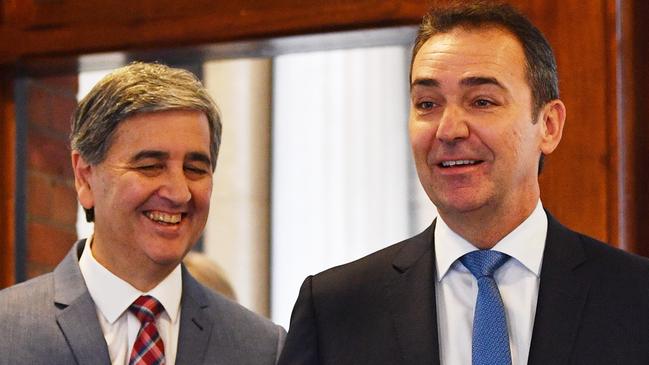Federal Budget 2019: Analysis by Mark Kenny and Daniel Wills
An ingenious blueprint for election success, or the dying gasp of a desperate government? The Advertiser’s top political analysts Daniel Wills and Mark Kenny share their insights on the Budget.

Opinion
Don't miss out on the headlines from Opinion. Followed categories will be added to My News.
- Interactive calculator: How the Federal Budget will affect you
- Main wrap: Big tax cuts and a return to surplus
- SA impact: Billions for roads but SA cops big revenue blow
An ingenious blueprint for election success, or the dying gasp of a desperate government? The Advertiser’s top political analysts Daniel Wills and Mark Kenny share their insights on the Budget.

Plenty of money ... is it enough to buy salvation?
By Contributing Political Editor Mark Kenny
Can a government have an embarrassment of riches? Surely not before an election freighted with existential implications.
Luckily for the Coalition, the national balance sheet is unusually healthy, so riches there are.
Indeed Canberra is swimming in revenue, courtesy of strong company tax receipts, high commodity prices, lower than expected spending, and yes, even bracket creep as rising PAYG incomes, for those lucky enough to experience growth, tip over into a steeper marginal rate.
Less luckily for a government whose threadbare personnel convey a fatigue deeper than their years suggest, its electoral stocks remain dismal, possibly heading towards junk bond status.
Could Budget 2019-20 change all that? That’s the $158 billion question. And some.
The 2019-20 blueprint is primarily a plea for the re-election of the Morrison government despite everything else for which a party that has had three prime ministers in three years has become known.
Its last roll of the dice presents as a shining story of economic success designed to replace a tawdry political narrative marked by failure on climate change and energy, squalid infighting over everything from coal to renewables to gay marriage and water, and overweening personal ambition.
All budgets are political, but this one has some genuinely heavy lifting to do.
It falls on the very eve of an election campaign ensuring its content will be judged most crucially at the ballot box.
In that sense, and given the polls, that’s where it may die. Labor has already made clear it plans a mini-budget of its own in September, if elected.
It will mirror some of the proposed tax cuts for the least well-off but not those aimed at the top end.
Typically, the election is degenerating into a tax-cut auction — Australia cursed to always spend its gains rather than bank them.
For his part, rookie Treasurer Josh Frydenberg knows he may only get one shot at being the nation’s top economic minister.
Perhaps this explains why the formula he has unveiled attempts to straddle the oil-and-water demands of responsible economics while simultaneously paying lip service to short-term political realities.
To these ends, his package contains immediate inducements to voters via a doubling of the Low and Middle Income Tax Offset (LIMITO) which payments are claimable in 13 weeks, while also conforming to the Liberals’ reputed strength as responsible fiscal managers. A series of strong surpluses totalling $45 billion over the next four years, has been projected with their scale supposedly reaching 1% of GDP by 2026-27.
Commonwealth net debt is also slated to be eliminated entirely by 2030.
Its centrepiece though is a colossal $158 billion worth of tax cuts made up of some $19.5 billion on the aforementioned LIMITO, and another $138.5 billion in revenue foregone through dropping the 32.5 cent marginal rate to 30 cents.
However, this latter change doesn’t even begin until July 1, 2024, and a government which has given up on the parliament will not try to legislate it in this parliament.
Will voters buy such ethereal promises? They’d have to be listening first.

The Premier has a headache — and an opportunity
By State Political Editor Daniel Wills
Premier Steven Marshall will be pumped that his federal colleagues have used what is likely their last Budget to help the rubber hit the road with big infrastructure spending ... while feeling seriously deflated by another GST collapse that plunges his planned surpluses into peril.
Despite fears that Canberra’s interest in SA would wane after a recent redraw reduced the state’s number of marginal seats, federal Treasurer John Frydenberg has opened the wallet with pledges on South Rd and rail crossings as well as new country projects. Many are well-targeted at a trio of seats the Coalition hopes to hold or win back next month.
The menu of possible new construction works offers a political boost for Mr Marshall, who is need of practical examples to prove his new government’s energy while fighting a Labor opponent that made infrastructure a key part of its party brand over 16 years.
The new commitment to level crossing upgrades actually mirrors promises made by Labor at the last state election, and are likely to be just as popular with Liberal backing.
But the further erosion of SA’s GST share, confirmed in the Federal Budget papers, is a huge looming headache for a new Liberal State Government that wants to make financial responsibility a hallmark.
Mr Lucas now faces a shortfall of close to half a billion dollars in the 2019-20 State Budget year when compared with what was anticipated only months ago. That is an incredibly big hole, and could ultimately be impossible to fill.
It means Mr Lucas will have to look at new savings that haven’t currently been put on the table and possibly even face calls to break promises, something he has so far been loath to do. But, perhaps frighteningly for some Liberals, it leaves almost no room for revision of cost-cutting that’s already been announced.
Last year’s State Budget did not slash and burn, but it did pick a few fights, including in key marginal state seats, that the Labor Party has been expertly exploiting. The closure of Service SA centres and axing of some bus routes have particular traction in areas that could make or break Mr Marshall’s second-term bid.
As GST revenue falls away, so does the capacity for a backflip that restores funding on the local issues which are eating at backbench confidence.
But those are concerns for another time. In the few weeks left between now and the federal election, expect Liberal faces to be smiling under hard hats, with shovels ready.


